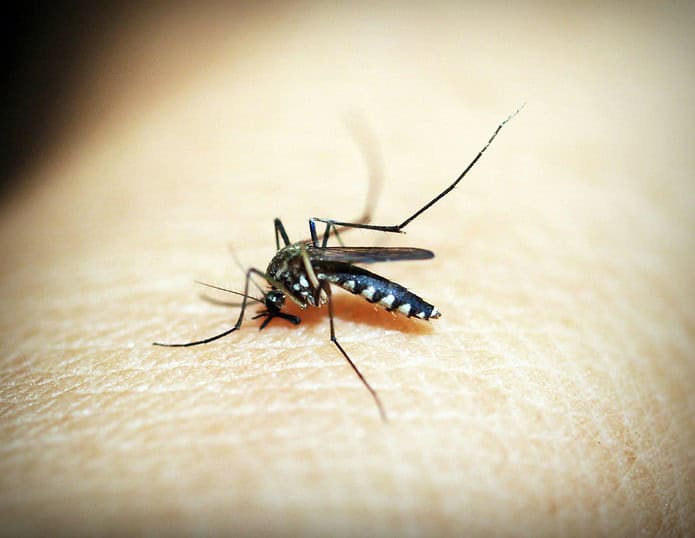Brooksville, FL: Hernando County is coordinating efforts to control high levels of adult flying mosquitoes from the aftermath of Hurricane Milton. Aerial treatments are a large part of this response to provide immediate relief for responders implementing ongoing recovery efforts and to protect human health.
Treatment operations targeting flying adult mosquitoes will be conducted after sunset and before sunrise starting Saturday, November 2, 2024, and due to the acreage, the aerial spay could continue Sunday, November 3, 2024, as weather permits. Applications cannot be conducted if the weather conditions exceed the limits set by the product labels such as instances of rain, high winds, and low temperatures. Further, this notification is contingent on no interruptions to current planned operations, such as weather and completion of existing spray missions, or other unforeseen delays. Aerial mission is from dusk to dawn each evening.
Please note in preparation for nighttime treatments, aircraft may be seen flying during the daytime to observe any potential obstacles that may interfere with the treatments made at night. These can include unmapped towers, power lines, guy wire, and other obstructions. These aircraft are not making applications.
Residents are encouraged to use EPA registered mosquito repellents to prevent bites and to check their yards for any containers holding standing water such as bird baths, clogged gutters, kid toys, rain barrels, tarps, etc. Mosquitoes lay eggs in standing water, dumping this water out at least once a week can reduce mosquito populations.
Frequently Asked Questions: Why are aerial treatments being conducted? Aerial treatments may be conducted in an emergency response such as post-hurricane event. Surveillance is conducted prior to any aerial treatments to confirm increased mosquito activity. If increased mosquito activity is identified, treatments are conducted in specific areas to control high population levels of adult flying mosquitoes which occur commonly after high rain events. This is done to provide relief for responders implementing ongoing recovery efforts and to protect human health.
Why do the planes fly during the daytime?
Low-flying aircraft that are out during the daytime are not conducting applications, but instead are observing any potential obstacles that may interfere with the treatments made at night. These can include unmapped towers, powerlines, guy wire and other obstructions.
What product is used in aerial treatments?
Due limited availability of products and concerns for decreased efficacy due to resistance, the primary active ingredient used during these applications is naled. This product is applied using up to 2 tablespoons of product for the area the size of a football field. Professional licensed contractors are required to follow all label directions and requirements when conducting treatments.
For more information, please refer to the EPA website below.
htps://www.epa.gov/mosquitocontrol/naled-mosquito-control
Precautionary safety practices for aerial applications:
It is good practice when pesticide spraying takes place for people to stay indoors with the windows shut to help reduce contact. If you are outdoors and you are concerned about being contacted by a treatment, immediately rinse your skin and eyes with water for 15 minutes. It is important to note that the timing of these treatments is scheduled when mosquitoes are most active, and people are typically indoors.
What are the potential impacts to honeybee hives?
Aerial mosquito control treatments are not typically considered a major concern for honeybee hives due to the timing of these treatments. Treatments are conducted in the late evening and over night when honeybee foragers have returned to their hives.
In an abundance of caution, below are a couple of options beekeepers can utilize if they choose to do so:
If you are concerned for “bearding” (honeybees clustering outside the entrance), you can add an empty super (no frames) to the top level of the hive to allow for more space for the honeybees to retreat inside the hive.
Beekeepers can also place a piece of plywood leaning against the front of the hive so that the honeybees can still move air in and out as needed but the entrance will be covered.
Covering hives with any other material is not recommended due to the concern for hive overheating.
Pets and wildlife exposure:
Risks to pets and wildlife from aerial application of naled for mosquito control are minimal because naled is applied from several hundred feet above the ground, at low rates, and it does not persist in the environment.
When used according to the label directions, even if they are outside during spraying, it is not likely to harm pets. To further reduce any risk of harm to your pet’s health, you can take the same safety steps as for humans.
Organic Farms:
If a county is aware of USDA certified organic farm who wishes to be excluded from the treated area, FDACS must receive notification of the area to be excluded by 2:00pm on the day the application is being made. More information regarding the consequences of a prohibited substance being applied to a certified operation due to a Federal or State emergency pest or disease treatment program can be found at 7 CFR 205.672 — Emergency pest or disease treatment. A database of USDA Certified Organic Farms and Businesses can be found at Organic Integrity Database (usda.gov).
What other measures could you take to reduce your exposure to mosquitoes?
Eliminate any standing water (even small amounts) to prevent mosquitoes from laying their eggs.
Use window and door screens to keep mosquitoes from entering your home, workplace, or children’s schools.
Use EPA-registered insect repellents to prevent bites. Products that are EPA-registered have been confirmed to be safe and effective when label directions are followed.
Dress in light-colored clothing, long pants, and long sleeves.
Visit the Hernando County Emergency Management website at www.HernandoCounty.us/EM for all storm-related notices or call the Public Information Center at 352-754-4083.
Questions specific to the aerial spraying, please contact Hernando County Mosquito Control at 352-540-6552 or visit https://www.hernandocounty.us/departments/departments-f-m/mosquito-control.
Sign up to receive severe weather alerts at www.AlertHernando.org
Follow us on Facebook @HernandoCountyEM
Follow us on Instagram @Hernandoeoc
Follow us on X (Twitter) @HernandoCo_EM

